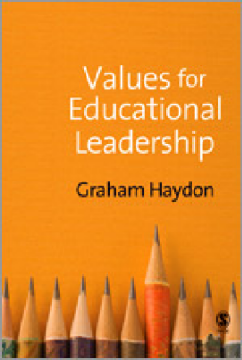
Additional Information
Book Details
Abstract
What are values? Where do our values come from? How do our values make a difference to education? For educational leaders to achieve distinction in their practice, it is vital to establish their own clear sense of values rather than reacting to the implicit values of others. This engaging book guides readers in thinking for themselves about the values they bring to their task and the values they intend to promote. Crucially, the book promotes critical thought and constructive analysis about the underlying values involved with: - aims and moral purpose in education - individual qualities in educational leadership - vision in education - school ethos and culture - the school as an educational community. By inviting reflection using valuable case studies and work-through activities, as well as referring to a wide range of academic literature, this book will be an important resource for those working towards professional qualifications such as NPQH, and invaluable for anyone aspiring to excellence in educational leadership. Graham Haydon is Senior Lecturer in Philosophy of Education at the Institute of Education, University of London, where he teaches on Masters courses in Values in Education and Applied Educational Leadership and Management.
Table of Contents
| Section Title | Page | Action | Price |
|---|---|---|---|
| Prelims (Contents, Tables, About the Editors) | |||
| 1. Introduction - Climate Change and Threatened Communities | |||
| A. Peter Castro, Dan Taylor, and David W. Brokensha | |||
| 2. Climate change and forest conservation: a REDD flag for Central African forest people? | |||
| Philip Burnham | |||
| 3. Social vulnerability, climatic variability, and uncertainty in rural Ethiopia: a study of South Wollo and Oromiya Zones of eastern Amhara Region | |||
| A. Peter Castro | |||
| 4. Farmers on the frontline: adaptation and change in Malawi | |||
| Kate Wellard, Daimon Kambewa, and Sieglinde Snapp | |||
| 5. Risk and abandonment and the meta-narrative of climate change | |||
| Dan Taylor | |||
| 6. Mobilizing knowledge to build adaptive capacity: lessons from southern Mozambique | |||
| J. Shaffer | |||
| 7. Climate change and the future of onion and potato production in West Darfur, Sudan: a case study of Zalingei locality | |||
| Yassir Hassan Satti and A. Peter Castro | |||
| 8. Comparing knowledge of and experience with climate change across three glaciated mountain regions | |||
| K.W. Dunbar, Julie Brugger, Christine Jurt, and Ben Orlove | |||
| 9. Aapuupayuu (the weather warms up): climate change and the Eeyouch (Cree) of northern Quebec | |||
| Kreg T. Ettenger | |||
| 10. ‘The one who has changed is the person’: observations and explanations of climate change in the Ecuadorian Andes | |||
| Kristine Skarbø, Kristin Vander Molen, Rosa Ramos, and Robert E. Rhoades | |||
| 11. Good intentions, bad memories, and troubled capital: American Indian knowledge and action in renewable energy projects | |||
| Raymond I. Orr and David B. Anderson | |||
| 12. Reclaiming the past to respond to climate change: Mayan farmers and ancient agricultural techniques in the Yucatan Peninsula of Mexico | |||
| Betty Bernice Faust, Armando Anaya Hernández, and Helga Geovannini Acuña | |||
| 13. Can we learn from the past? policy history and climate change in Bangladesh | |||
| David Lewis | |||
| 14. Local perceptions and adaptation to climate change: a perspective from Western India | |||
| Dineshkumar Moghariya | |||
| 15. Ethno-ecology in the shadow of rain and light of experience: local perceptions of drought and climate change in East Sumba, Indonesia | |||
| Yancey Orr, Russell Schimmer and Roland Geerken | |||
| 16. Local knowledge and technology innovation in a changing world: traditional fishing communities in Tam Giang Cau Hai lagoon, Vietnam | |||
| Thanh Vo and Jack Manno | |||
| 17. Conclusion: some reflections on indigenous knowledge and climate change | |||
| Dan Taylor, A. Peter Castro, and David W. Brokensha | |||
| Back Matter (Resources, Notes, Index) |
